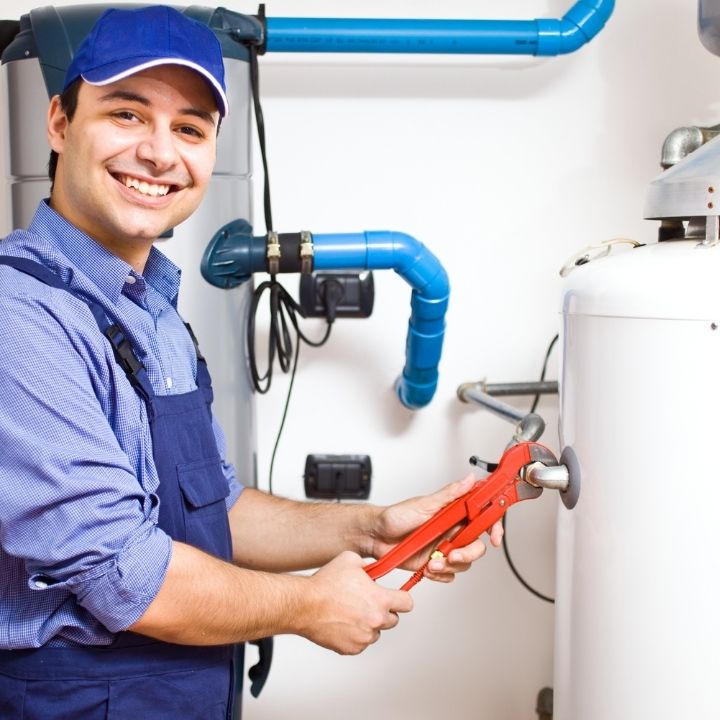
A functional water heater is essential for everyday comfort and convenience, providing hot water for various household tasks like bathing, cooking, and cleaning. However, like any appliance, water heaters have a limited lifespan and may require replacement over time. In this blog, we’ll explore the signs indicating when it’s time to replace your water heater and how to navigate the installation process. By understanding these key indicators, homeowners can avoid unexpected disruptions to their hot water supply and ensure the continued efficiency of their home systems. Let’s delve into the telltale signs that your water heater may be nearing the end of its service life, and discuss the steps involved in installing a new unit to maintain uninterrupted access to hot water.
Signs It’s Time to Replace Your Water Heater
A water heater is a vital appliance in any home, providing hot water for various daily activities. However, over time, water heaters can develop issues that affect their performance and efficiency. Recognizing these signs early can help homeowners avoid unexpected breakdowns and costly repairs. Here are five common signs indicating it may be time to replace your water heater:
- Decreased Water Temperature and Inconsistent Heating:
One of the most noticeable signs of a failing water heater is a decrease in water temperature or inconsistent heating. If you find yourself needing to turn up the temperature setting on your water heater to maintain warm water, it could indicate a problem with the heating element or thermostat. In some cases, sediment buildup in the tank can also contribute to reduced heating efficiency.
- Rusty or Discolored Water:
Another indication of water heater trouble is rusty or discolored water coming from your faucets. This could be a sign of corrosion inside the tank, which may lead to leaks or other issues. Rusty water can also indicate that the sacrificial anode rod, which helps prevent corrosion, needs replacement. Ignoring rusty water can result in further damage to your water heater and potentially contaminated water.
- Strange Noises Coming from the Water Heater:
Unusual noises, such as popping, banging, or rumbling sounds, emanating from your water heater can be a cause for concern. These noises are often attributed to sediment buildup at the bottom of the tank, which causes the heating element to overheat and make sounds as it attempts to heat the water. Ignoring these noises can lead to decreased efficiency and eventual failure of the water heater.
- Leaks or Puddles Around the Water Heater:
Visible leaks or puddles of water around the base of your water heater are clear indicators of a problem. Leaks can occur due to corrosion, loose connections, or a faulty pressure relief valve. Ignoring leaks can lead to water damage to surrounding areas and potential mold growth. In such cases, it’s crucial to address the issue promptly to prevent further damage.
- Age of the Water Heater Exceeding its Lifespan:
Finally, the age of your water heater is a significant factor to consider. Most traditional tank water heaters have a lifespan of around 8 to 12 years. If your water heater is nearing or exceeding this timeframe, it’s wise to start considering a replacement, even if it’s not exhibiting any obvious signs of failure. Aging water heaters are more prone to issues such as corrosion and decreased efficiency.
In conclusion, being aware of these five signs can help homeowners identify when it’s time to replace their water heater. Addressing these issues promptly can prevent inconvenience, costly repairs, and potential damage to your home. If you notice any of these signs, it’s advisable to consult a professional plumber to assess the situation and recommend the best course of action.
Understanding the Installation Process
Installing a new water heater can be a complex task that requires careful preparation and adherence to safety protocols. While some homeowners may attempt to tackle the installation themselves, it’s often best to enlist the help of professionals to ensure the job is done correctly and safely.
Preparing for Installation: Gathering Necessary Tools and Materials
Before beginning the installation process, it’s essential to gather all the necessary tools and materials. This may include a pipe wrench, adjustable wrench, tubing cutter, pipe thread compound, Teflon tape, and a new water heater suitable for your home’s needs. Additionally, ensure you have access to the manufacturer’s installation instructions for reference throughout the process.
Safety Precautions to Observe During Installation
Safety should always be a top priority when installing a water heater. Ensure the power and water supply to the old water heater are shut off before beginning any work. Additionally, take precautions to protect yourself from potential hazards such as hot water, electrical shocks, and gas leaks. If you’re unsure about any aspect of the installation process, it’s best to consult a professional plumber.
Steps Involved in Installing a New Water Heater:
1. Shutting Off the Power and Water Supply: Locate the circuit breaker or gas valve connected to the water heater and turn it off to cut off the power or gas supply. Shut off the water supply to the water heater as well.
2. Draining the Old Water Heater: Connect a garden hose to the drain valve at the base of the water heater and run it to a floor drain or outside. Open the drain valve and allow the water heater to drain completely.
3. Disconnecting the Old Unit: Disconnect the plumbing connections and carefully remove the old water heater from its location.
4. Preparing the Area for the New Water Heater: Clean the area where the new water heater will be installed and ensure it meets local building codes and regulations.
5. Connecting the New Water Heater: Install the new water heater according to the manufacturer’s instructions, connecting the plumbing and ensuring all connections are secure.
While these steps outline the basic installation process, it’s important to note that handling gas, electrical, and plumbing components can be dangerous and complex. For optimal results and peace of mind, it’s recommended to seek the assistance of licensed professionals who have the expertise and experience to safely install your new water heater.
How Experts Can Help
When it comes to installing a new water heater, enlisting the expertise of professional plumbers can make all the difference in ensuring a smooth and successful installation process. Here’s why turning to experts is the preferred choice:
Importance of Hiring Professional Plumbers for Water Heater Installation
Professional plumbers are trained and experienced in handling various types of water heaters, from traditional tank models to tankless and heat pump systems. Their expertise allows them to assess your home’s specific needs and recommend the most suitable water heater for optimal performance and energy efficiency. Additionally, plumbers are familiar with local building codes and regulations, ensuring that your installation meets all necessary requirements.
Benefits of Professional Installation: Expertise, Safety, and Warranty Coverage
One of the primary benefits of professional installation is the assurance of quality workmanship and attention to detail. Plumbers have the knowledge and skills to properly install water heaters, minimizing the risk of errors or complications that could arise from DIY attempts. Furthermore, professional installation prioritizes safety, reducing the likelihood of accidents or injuries during the installation process.
Another advantage of hiring professionals is access to warranty coverage. Many water heater manufacturers offer warranties that may be voided if the unit is not installed by a licensed plumber. By choosing professional installation, homeowners can ensure that their warranty remains valid, providing added protection and peace of mind in the event of unforeseen issues with the water heater.
Finding Reputable Plumbing Companies and Getting Quotes
When seeking professional assistance for water heater installation, it’s essential to research and select reputable plumbing companies with a track record of quality service and customer satisfaction. Consider reading reviews, asking for recommendations from friends or family, and verifying licenses and credentials before making a decision.
Once you’ve narrowed down your options, contact multiple plumbing companies to request quotes for the installation project. Compare pricing, services offered, and any additional benefits or guarantees provided by each company to make an informed choice that aligns with your budget and needs.
Conclusion
In conclusion, recognizing the signs that indicate the need for water heater replacement, such as decreased water temperature, rusty water, strange noises, leaks, and an aging unit, is crucial for maintaining a functional household. Additionally, understanding the installation process and the benefits of seeking expert assistance ensures a smooth and safe transition to a new water heater. If you notice any of these signs in your water heater, it’s important to take prompt action to address the issue before it worsens.
By enlisting the help of professional plumbers, homeowners can enjoy peace of mind knowing that their water heater is installed correctly and efficiently. Ultimately, prioritizing the maintenance and replacement of your water heater ensures a reliable supply of hot water for your home’s daily needs, contributing to the comfort and convenience of your household.


